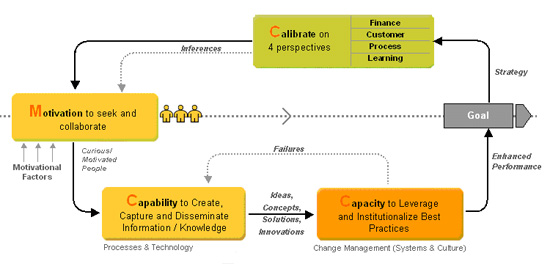Contribute
| Technology Enabled Learning And Innovation |
Sunil Singhal
08/31/2004
(This article is sponsored by The Boston Group)
A living corporation continually learns and renews its core competencies and intellectual capital for the sole purpose of its survival and growth. This has never been truer as in today’s competitive world. US corporations have spent hundreds of millions of dollars in technology under the umbrella of Knowledge Management to enhance participation of their workforce in innovation and idea generation. Alas, the results have been disappointing to the extent that Knowledge Management has become a bad word that nobody wants to be seriously involved with.
Nihilent Technologies, founded by a group of seasoned professionals and funded by two major South African corporations, has developed a holistic approach to learning and innovation combining aspects of individual motivation to seek and collaborate, dissemination of knowledge through technology, institutionalization of best practices and performance measurement.
The proprietary transformation framework labeled as MC3, is a holistic approach to enhance the organization’s performance at all levels, enabled by people who learn to apply the right business processes, supported by technology that works. The MC3 framework is depicted below.

While the application of the MC3 framework is tailored to suit each organization’s requirements, it addresses the following constituents:
· Intent Management (Create a mindset for learning and define a learning agenda tied to the business goal and encourage individuals to learn better and perform better)
· Content Management (Facilitate capture of Tacit Knowledge from suppliers, customer and internal experts and acquire competitive and business intelligence)
· Action Management (Apply the learning and thus changing the way in which the organization performs) and
· Performance Management (Re-aligning individual goals with organizational goals, assessing and analyzing performance based on these metrics).
When rephrased, the four constituents symbolize MC3 in terms of Motivation to seek and collaborate, Capability to create, capture and disseminate knowledge & information, Capacity to leverage and institutionalize best practices and Calibrate performance against predefined goals.
Benefits
The MC3 driven Initiative has benefits at the Individual, Team and Corporate Level. Listed below are some of the benefits that would be realized:
§ Improved quality of services offered to stakeholders
§ Faster and better responses to customer requests/needs, leading to customer satisfaction
§ Adapting to shifting customer preferences & demands faster
§ Tapping more opportunities in the market
§ Improved quality of decisions and reduced time to solve business problems
§ Improved employee productivity
§ Increased pace of innovations in products and services
§ Reduced impact of employee turnover
And, as a result of all of the above, the organization will gain a return on its investment in terms of reduced operational costs and increased business revenue.
MC3 Implementation at STRATE
It was the beginning of March 2003. Monica Singer, CEO of STRATE, the organization that did electronic settlement of all equity trades in South Africa, was planning the way forward for the balanced scorecard driven knowledge management intervention that STRATE had implemented over the past eight months. At the beginning of 2002, most of the knowledge about STRATE's business had resided with the consultants that had helped to establish STRATE and the IT systems that were so critical to its functioning. It was a situation that could not continue, and Singer had asked Nihilent, a firm of business consultants, to help her to remedy the situation. What she had initially thought would be a simple knowledge transfer exercise had resulted in comprehensive organizational transformation, and she was delighted with the outcome.
Nihilent implemented its patented MC3 framework for learning and innovation at STRATE. It began with the first phase of scoping that included review of the current status and the business situation of STRATE and suggested areas of improvement for transforming STRATE into a learning organization. To ensure client comfort, reduced risk and to capitalize on experience, Nihilent decided to pilot the implementation in the IT Division in Phase 2 and then roll it out across the organization in Phase 3.
The benefits derived by STRATE included Reduced operations cost through enhanced competencies & productivity; Increased revenue through new products & services; Drastic reduction in outsourcing costs; Clear basis to HR to build performance appraisal systems; Reduced attrition risk; and Business processes aligned to achieve strategy.
In the words of Monica Singer, CEO, STRATE: "In STRATE's case I can confirm that it far exceeded our expectations and on a daily basis we were experiencing the magic of what this process has done for our company and its people"
MC3 has been also successfully deployed at SARS to establish a Metrics Office; at SAA for a Skills, Knowledge and Competencies Audit; at Sasol for Knowledge Management; and at Allianz Bajaj for Management Reporting through Data Warehousing. WITS Business School has chosen Nihilent's MC3 implementation at STRATE as a case study for its MBA students. Additional information is available at www.mc3consulting.com and www.nihilent.com.
You may also access this article through our web-site http://www.lokvani.com/

